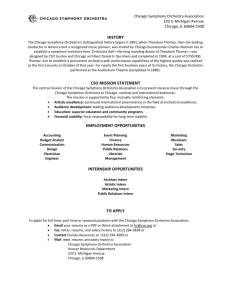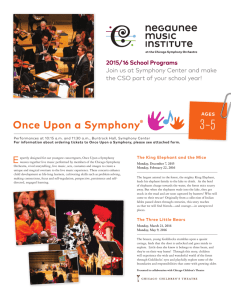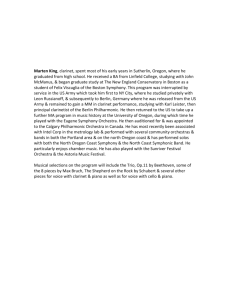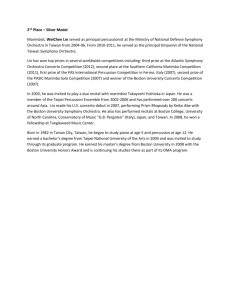MusicNOW SERIES LAUNCHES 2014/15 SEASON WITH
advertisement
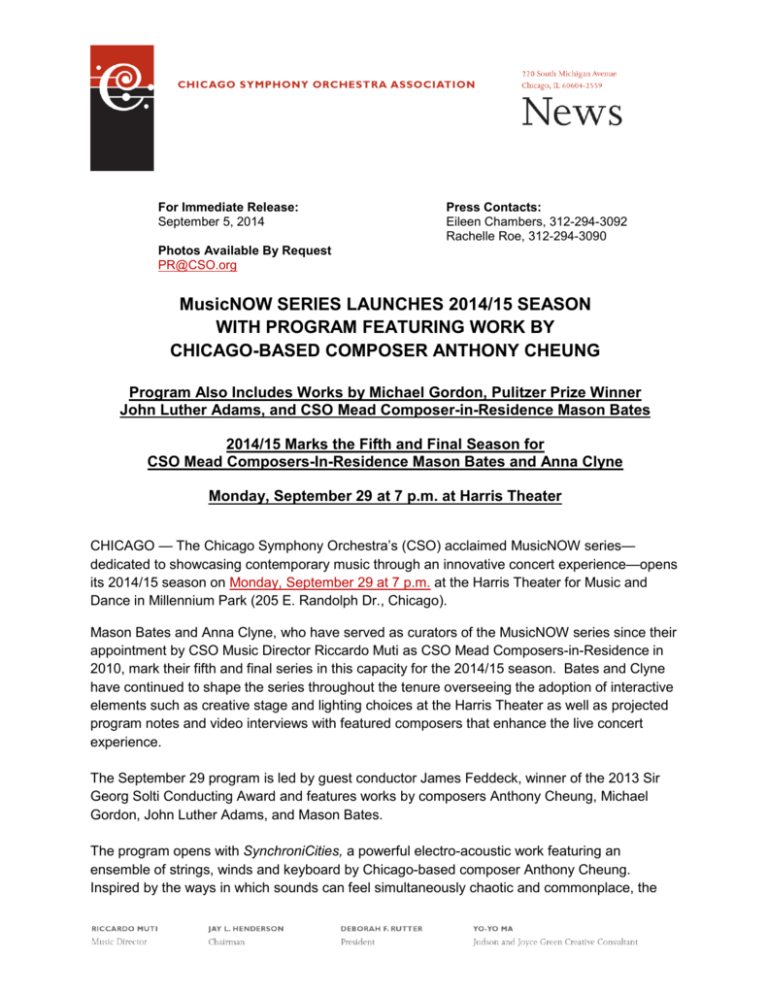
For Immediate Release: September 5, 2014 Press Contacts: Eileen Chambers, 312-294-3092 Rachelle Roe, 312-294-3090 Photos Available By Request PR@CSO.org MusicNOW SERIES LAUNCHES 2014/15 SEASON WITH PROGRAM FEATURING WORK BY CHICAGO-BASED COMPOSER ANTHONY CHEUNG Program Also Includes Works by Michael Gordon, Pulitzer Prize Winner John Luther Adams, and CSO Mead Composer-in-Residence Mason Bates 2014/15 Marks the Fifth and Final Season for CSO Mead Composers-In-Residence Mason Bates and Anna Clyne Monday, September 29 at 7 p.m. at Harris Theater CHICAGO — The Chicago Symphony Orchestra’s (CSO) acclaimed MusicNOW series— dedicated to showcasing contemporary music through an innovative concert experience—opens its 2014/15 season on Monday, September 29 at 7 p.m. at the Harris Theater for Music and Dance in Millennium Park (205 E. Randolph Dr., Chicago). Mason Bates and Anna Clyne, who have served as curators of the MusicNOW series since their appointment by CSO Music Director Riccardo Muti as CSO Mead Composers-in-Residence in 2010, mark their fifth and final series in this capacity for the 2014/15 season. Bates and Clyne have continued to shape the series throughout the tenure overseeing the adoption of interactive elements such as creative stage and lighting choices at the Harris Theater as well as projected program notes and video interviews with featured composers that enhance the live concert experience. The September 29 program is led by guest conductor James Feddeck, winner of the 2013 Sir Georg Solti Conducting Award and features works by composers Anthony Cheung, Michael Gordon, John Luther Adams, and Mason Bates. The program opens with SynchroniCities, a powerful electro-acoustic work featuring an ensemble of strings, winds and keyboard by Chicago-based composer Anthony Cheung. Inspired by the ways in which sounds can feel simultaneously chaotic and commonplace, the piece pairs field recordings captured in various locations with live music, redefining sonic associations through combination and juxtaposition. The piece premiered in 2012 with the New York-based Talea ensemble, of which Cheung is a founding member. The multimedia work, Light is Calling is next on the program. Created by filmmaker Bill Morrison and composer Michael Gordon, cofounder of the innovative music collective Bang on a Can, the piece juxtaposes the sound of an acoustic violin with warped electronic pulses played backwards. The music is accompanied by a short film by Morrison, created by reprinting and reediting a scene from the black-and-white 1926 movie, The Bells. Light is Calling, which highlights a range of Gordon’s recent compositions, was released by Nonesuch in 2004. After the death of his close friend, fellow composer and environmentalist Gordon Wright, Pulitzer Prize-winning composer John Luther Adams composed three pieces for solo violin titled Three High Places. These led to the composition of the pastoral ambient string quartet, The Wind in High Places, which is part of the September 29 MusicNOW program. The quartet, built on natural harmonics and open strings, was premiered in 2011 by the acclaimed, New Yorkbased Ethel Quartet. The program closes with The Rise of Exotic Computing, a composition for sinfonietta and laptop by CSO Mead Composer-in-Residence Mason Bates. The work, which features a 14-piece ensemble of strings, winds, trumpet, piano and harp, received its world premiere in 2013 by the Pittsburgh Symphony Orchestra, which commissioned the piece. One of the hallmarks of the MusicNOW series is its innovative concert format. Pre- and postconcert DJ sets are performed by artists from Chicago DJ collective illmeasures, and projected program notes featuring video messages from each composer take the place of a traditional program booklet. After the concert, there is a reception in the public spaces of the Harris Theater with complimentary pizza and beer offering concertgoers a chance to mingle with the musicians, guest artists and composers. MusicNOW Supporters MusicNOW receives funding through a leadership challenge grant from Irving Harris Foundation, Joan W. Harris. Major support is provided by Cindy Sargent and the Sally Mead Hands Foundation. MusicNOW Media Sponsors are WBEZ and RedEye. Program & Ticket Details Tickets for all CSOA concerts can be purchased by phone at 800-223-7114 or 312-294-3000; online at cso.org, or at the Symphony Center box office: 220 S. Michigan Ave., Chicago, IL 60604. Discounted student tickets for select concerts can be purchased, subject to availability, online in advance or at the box office on the day of the concert. For group rates, please call 312-2943040. Artists, programs and prices are subject to change. ### Symphony Center Presents MusicNOW Harris Theater for Music and Dance 205 E. Randolph Drive, Chicago Monday, September 29, 2014, 7 p.m. Musicians from the Chicago Symphony Orchestra Mason Bates, Mead Composer-in-Residence Anna Clyne, Mead Composer-in-Residence James Feddeck, conductor CHEUNG GORDON ADAMS BATES SynchroniCities Light Is Calling The Wind in High Places The Rise of Exotic Computing Tickets: $25, General Admission $10, Students About Anthony Cheung Anthony Cheung (b. 1982, San Francisco) is a Chicago-based composer and pianist. He began his musical studies at the age of six on the piano and wrote his first compositions a year later. An early exposure to 20th century concert music and jazz/improvised music, as well as study of the traditional classical repertoire, fostered his early musical development and led to an interest in composition. Cheung graduated from Harvard University in 2004 with a joint degree in Music and History. He obtained his doctorate from Columbia University, where he taught and served as Assistant Conductor of the Columbia University Orchestra. Cheung’s compositions have been commissioned by ensembles including the Ensemble Modern, Ensemble Intercontemporain, New York Philharmonic, Frankfurt Radio Symphony Orchestra, Talea Ensemble, and Scharoun Ensemble of the Berlin Philharmonic. Cheung is co-founder, Artistic Director and pianist of the Talea Ensemble in New York. With the Talea Ensemble, he actively programs and promotes new music, and has performed extensively in the U.S. and abroad as a specialist of new music. In 2012/13, he was in residence at the American Academy in Rome as a recipient of the Rome Prize. In 2008, he received both First Prize and Public Prize at the 6th International Dutilleux Competition, for his work Windswept Cypresses. In 2006, he received the Charles Ives Fellowship from the American Academy of Arts and Letters, which also honored him with the Charles Ives Scholarship in 2003. He has also received five ASCAP Morton Gould awards (including the Leo Kaplan Award in 2011), commissions from the Koussevitzky and Fromm foundations, and the Harvard Office for the Arts' Louis Sudler Prize. Cheung is currently an Assistant Professor of Music at the University of Chicago. About Michael Gordon Born in Miami Beach in 1956, composer Michael Gordon holds a Bachelor of Arts from New York University and a Masters of Music from the Yale School of Music. He is co-founder and co-artistic director of New York's legendary music collective Bang on a Can. Over the past 25 years, Gordon has produced a strikingly diverse body of work, ranging from large-scale pieces for high-energy ensembles to major orchestral commissions to works conceived specifically for the recording studio. Transcending categorization, this music represents the collision of mysterious introspection and brutal directness. Deeply passionate about the sonic potential of the traditional orchestra, Gordon has been commissioned by Lincoln Center, Carnegie Hall, the Stuttgart Ballet, the New World Symphony, the National Centre for the Performing Arts Beijing, the BBC Proms, the Brooklyn Academy of Music, Settembre Musica, the Holland Music Festival, the Dresden Festival and the Sydney 2000 Olympic Arts Festival, among others. His music has been performed at the Kennedy Center, Theatre De La Ville, Barbican Centre, Oper Bonn, Kölner Philharmonie and the Southbank Centre. Michael Gordon's special interest in adding dimensionality to the traditional concert experience has led to numerous collaborations with artists in other media, most frequently with filmmaker Bill Morrison and Ridge Theater. Gordon and Morrison have worked together on many works, including cult favorite Decasia and two film symphonies centered on cities: Dystopia (about Los Angeles) in 2008 and Gotham (about New York City) in 2004. Gordon and Morrison are reunited in the 2014/15 season for the premiere of a third installment of their city pieces (about Miami), commissioned by the New World Symphony. The recipient of multiple awards and grants, Gordon has been honored by the Guggenheim Foundation, the National Endowment for the Arts, the Foundation for Contemporary Performance Arts, and the American Academy of Arts and Letters. About John Luther Adams Described as "one of the most original musical thinkers of the new century" (Alex Ross, The New Yorker), John Luther Adams is a composer whose life and work are deeply rooted in the natural world. His orchestral work, Become Ocean, was awarded the 2014 Pulitzer Prize in Music. Adams composes for orchestra, chamber ensembles, percussion and electronic media, and his music is recorded on Cold Blue, New World, Mode, Cantaloupe, and New Albion. A recipient of the Heinz Award for his contributions to raising environmental awareness, Adams has also been honored with the Nemmers Prize from Northwestern University "for melding the physical and musical worlds into a unique artistic vision that transcends stylistic boundaries." Adams has taught at Harvard University, the Oberlin Conservatory, Bennington College, and the University of Alaska. He has been composer in residence with the Anchorage Symphony, Anchorage Opera, Fairbanks Symphony, Arctic Chamber Orchestra, and the Alaska Public Radio Network, and he has served as president of the American Music Center. About Mason Bates Recently awarded the Heinz Medal in the Humanities, Mason Bates writes music that fuses innovative orchestral writing, imaginative narrative forms, the harmonies of jazz and the rhythms of techno. Widely performed by orchestras large and small, his symphonic music has been the first to receive widespread acceptance for its expanded palette of electronic sounds, and it is championed by leading conductors such as Riccardo Muti, Michael Tilson Thomas, and Leonard Slatkin. He has become a visible advocate for bringing new music to new spaces, whether through institutional partnerships such as his residency with the Chicago Symphony, or through his classical/DJ project Mercury Soul, which has transformed spaces ranging from commercial clubs to Frank Gehry-designed concert halls into exciting, hybrid musical events drawing over a thousand people. In awarding Bates the Heinz Medal, Teresa Heinz remarked that “his music has moved the orchestra into the digital age and dissolved the boundaries of classical music.” Continuing performances of works such as Mothership, which premiered at the Sydney Opera House by the YouTube Symphony to an online audience of 1.8 million, have demonstrated that electronic sounds can be a welcome addition to the orchestral palette with minimal logistics. While Bates often performs the electronica onstage with orchestras, dozens of repeat performances of his symphonic music happen without him, and many purely acoustic works complement his diverse catalogue. About James Feddeck Winner of the 2013 Sir Georg Solti Conducting Award, James Feddeck’s career in North America has developed strongly following his last season when he served as Assistant Conductor with The Cleveland Orchestra. During his tenure there Feddeck conducted subscription concerts at Severance Hall, Blossom, and stepped in for Franz Welser-Möst in Cleveland’s fully-staged production of Don Giovanni and in subscription performances of Carmina Burana, both to critical acclaim. He has also been a regular guest conductor at the Atlanta and Indianapolis symphonies. This year, Feddeck has gone on to successful debuts in the U.S. with the Houston Symphony and Los Angeles Chamber Orchestra and internationally with the Residentie Orkest at the Concertgebouw in Amsterdam and the Royal Scottish National Orchestra. In addition, to the Solti Award, Feddeck received the Aspen Conducting Prize in 2008, and was awarded the Robert J. Harth Conductor Prize in 2007. He was the unanimous winner of the Sixth Vakhtang Jordania International Conducting Competition and, at twenty-two, its youngest participant. An accomplished organist, Feddeck has performed recitals throughout Europe and North America, has won competitions sponsored by the American Guild of Organists and has been featured on the nationally syndicated radio program Pipedreams. Feddeck studied oboe, piano, organ, and conducting at the Oberlin Conservatory of Music, which recognized Feddeck as the first recipient of the Outstanding Young Alumni Award. The Chicago Symphony Orchestra: www.cso.org and www.csosoundsandstories.org Founded in 1891, the Chicago Symphony Orchestra is consistently hailed as one of the greatest orchestras in the world. Its music director since 2010 is Riccardo Muti, one of the preeminent conductors of our day. Pierre Boulez is the CSO’s Helen Regenstein Conductor Emeritus; Yo-Yo Ma is the CSO’s Judson and Joyce Green Creative Consultant. Mason Bates and Anna Clyne are the CSO’s Mead Composers-in-Residence. From the baroque through contemporary music, the CSO commands a vast classical repertoire. The renowned musicians of the CSO annually perform more than 150 concerts, most at Symphony Center in Chicago and, each summer, at the suburban Ravinia Festival. They regularly tour nationally and internationally; since 1892, the CSO has made 57 international tours, performing in 28 countries on five continents. Listeners around the globe enjoy weekly radio broadcasts of CSO concerts and recordings on the WFMT network and online at cso.org/Radio. Recordings by the CSO have earned a total of 62 Grammy Awards, including two in 2011 for the first recording Muti released with the Chicago Symphony Orchestra and Chorus, Verdi's Messa da Requiem. The parent organization for the CSO is the Chicago Symphony Orchestra Association. It includes the Chicago Symphony Chorus and the Civic Orchestra of Chicago, a training ensemble. Through its Symphony Center Presents series, the CSOA presents guest artists from a variety of genres—classical, jazz, pop, world, and contemporary. The Negaunee Music Institute at the CSO offers a variety of community and education programs that engage more than 200,000 people of diverse ages and backgrounds. Through the Institute and other activities, the CSO promotes the concept of Citizen Musicianship: using the power of music to create connections and build community. The CSO is supported by tens of thousands of volunteers; patrons; and corporate, foundation, government, and individual donors. Bank of America is the Global Sponsor of the CSO.
